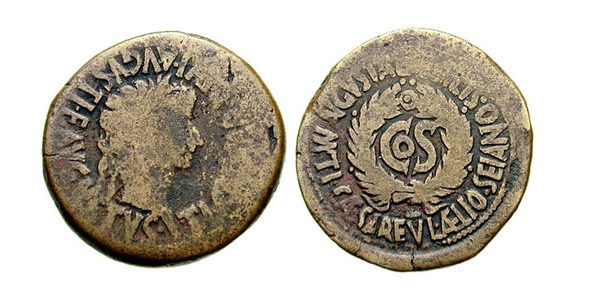October 18, 2016, by Will Leveritt
On this day in AD 31 the Praetorian Prefect Sejanus was executed.
Text by Juliet O’Brien
Lucius Aelius Sejanus was not from an aristocratic Roman family, but was born at Volsinii in Etruria (modern-day Tuscany). He was the son of the knight L. Seius Strabo, and was of equestrian rank.

AE as of Tiberius. Obv. has laureate head of the emperor r., TI CAESAR DIVI AVGVSTI F AVGVSTVS. Reverse has laurel wreath surrounding COS. Around, MVN AVGVSTA BILBILIS TI CAESARE V L AELIO SEIANO; Sejanus’ name appears around 3 o’clock. Image courtesy Classical Numismatic Group, Inc. http://www.cngcoins.com
The emperor Augustus established the Praetorian Guard in 27 BC as a bodyguard for himself and the imperial family. At some point Sejanus’ father Strabo was made Prefect, and from AD 14 he held the post jointly with Sejanus until he was sent to Egypt as governor. Sejanus remained in sole command of the Guard.
He worked to become one of the closest of Tiberius’ friends and advisors, amassing great power and influence in the process, which he used to further his own ambitions. He made sure to display devotion to the emperor personally, for example shielding him with his own body when the roof of a villa collapsed on them during a dinner party in AD 26. Tiberius had described Sejanus in apparently affectionate terms as his adjutor imperii (imperial assistant) in speeches.
He began to orchestrate the removal of members of the imperial family, who were a threat to his own power. It seems that in AD 23 he poisoned Tiberius’ son Drusus with the connivance of Drusus’ wife Livilla, who had become his lover.
His next move came in AD 25 when he sought Livilla’s hand in marriage from Tiberius, in order to tie himself even more closely to the emperor. This request was refused, which seems to have panicked Sejanus. Perhaps it was a sign that he did not yet fully control Tiberius. As a result, in AD 26, Sejanus convinced Tiberius to permanently leave Rome and retire to his villa at Capri. This move allowed Sejanus to exert greater control over both Tiberius and events at Rome.
Now administering affairs from the capital, Sejanus controlled the Senate through fear of prosecution (for treason) on the one hand, and the awarding of sought-after offices and governorships on the other.
Sejanus is particularly notorious for his role in the deaths of the family of Germanicus, a popular Julio-Claudian prince and Tiberius’ adopted son. He died in AD 19, possibly poisoned by an agent of Tiberius himself.
In AD 29 Sejanus orchestrated the trial of Germanicus’ widow, Agrippina the Elder, and her sons Drusus and Nero, on a charge of plotting against Tiberius. They were exiled to various islands from which they were never released. All were dead by AD 33.
Sejanus’ career peaked in AD 31 when he began the year as consul with the emperor himself. That same year he was at last given permission to marry Livilla (or possibly her daughter Julia, the sources are not clear).
Unfortunately for Sejanus, 31 was also the year his plans unravelled. The events surrounding his downfall are unclear. Josephus suggests that Tiberius turned against Sejanus when he learned through a letter from Antonia (Germanicus’ mother) that Sejanus’ was planning to overthrow Tiberius.
Cassius Dio says that Tiberius had eventually become aware of how much power Sejanus had amassed and sought a way to have him executed. He tested the degree of Sejanus’ support by sending contradictory letters to Rome, some claiming he was dying, others that he would soon be in Rome.
The confusion persuaded many of Sejanus backers to remove their support until they knew where they stood. This convinced Tiberius to strike. He sent a letter to the Senate denouncing Sejanus. At a meeting of the Senate on 18 October, AD 31 the letter was read out and Sejanus was condemned to death. Sejanus was led away to prison, and in the evening of the same day he was executed by strangulation. His body was flung down the Gemonian Steps.
Sejanus’ execution was followed by bloody purges of his supporters and family. Even his young children were not spared, including his teenage daughter who was supposedly raped before her death, since virgins could not lawfully be killed under Roman law.
It is far from clear what Sejanus’ ultimate ambitions were; yet it is certain is that they ended in failure.
No comments yet, fill out a comment to be the first

Leave a Reply